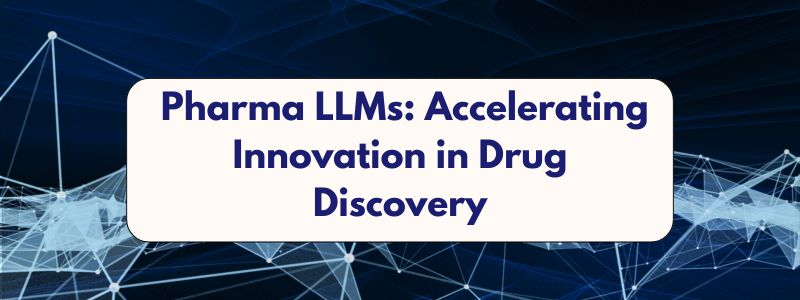Pharma LLMs: Accelerating Innovation in Drug Discovery

The impact of LLMs is particularly profound in areas where traditional methods have struggled. Drug discovery is a complex, data-intensive process that involves numerous stages, from initial research to clinical trials. LLMs can streamline these stages by providing insights that are not only faster but also more accurate. This integration of AI in pharmaceuticals signals a move towards more efficient and cost-effective drug development processes, setting a new standard for the industry.
The application of AI in pharmaceuticals is not merely a futuristic concept; it is a tangible reality reshaping the industry. AI technologies, particularly LLMs, can process vast amounts of data, identify patterns, and make predictions that were previously unimaginable. This capability is crucial for addressing the multifaceted challenges faced by drug discovery specialists, including data integration, quality assurance, and ethical compliance. The automation and precision offered by AI can potentially transform every aspect of drug discovery, from initial research phases to post-market surveillance.
Unlocking Dynamic Learning and Insight Generation
Moreover, AI's role extends beyond just data processing; it introduces a level of adaptability and learning that traditional methods lack. With the ability to continuously learn from new data inputs, AI systems can evolve with the research, ensuring that the insights they provide remain relevant and cutting-edge. This dynamic capability positions AI as an indispensable tool in the drug discovery toolkit, enabling researchers to navigate the complexities of modern medicine with greater ease and confidence.
LLMs are designed to comprehend and generate human-like text, making them exceptionally suited for tasks that require nuanced understanding and context. In the realm of drug discovery, they facilitate the analysis of scientific literature, patents, clinical trial reports, and even social media data to derive insights that can guide research and development efforts.
Revolutionising the Drug Discovery Pipeline
The integration of LLMs into drug discovery workflows promises to revolutionise the identification and validation of new drug candidates. By leveraging predictive analytics, researchers can expedite the drug development process, reducing both time and cost. LLMs can sift through extensive datasets to pinpoint potential drug targets, predict molecular interactions, and optimise lead compounds, thereby streamlining the entire pipeline. Additionally, the predictive capabilities of LLMs extend to anticipating adverse drug reactions and optimising dosage regimens, which can significantly enhance patient safety and treatment efficacy.
Real-World Applications and Case Studies
Several pharmaceutical companies and research institutions are already harnessing the power of LLMs to advance drug discovery. In one notable instance, a leading pharmaceutical company employed LLMs to enhance their predictive modelling capabilities for cancer therapies. By analysing genomic data and patient records, the LLMs identified novel biomarkers and potential drug targets, significantly accelerating the development of targeted treatments. During the COVID-19 pandemic, LLMs played a pivotal role in accelerating vaccine development. By rapidly processing and synthesising vast amounts of biomedical literature, LLMs enabled researchers to identify promising vaccine candidates and optimise formulation strategies.
Navigating Ethical and Regulatory Considerations
While the advantages of LLMs in drug discovery are evident, it is imperative to address the ethical and regulatory implications associated with their use. The deployment of AI models must adhere to stringent ethical standards to ensure patient safety, data privacy, and transparency in decision-making processes. Regulatory agencies worldwide are recognising the potential of AI in drug discovery and are adapting their frameworks to accommodate these advancements. Compliance with regulatory standards is essential to gain approval for AI-driven drug development processes. Rajvir Madan, Chief Digital and Information Technology Officer, Arcutic Biotherapeutics, says that, “This (regulations) is a big unknown, especially in the US, given the evolving political landscape and upcoming changes at the FDA. We are all closely monitoring this to see how this evolves.”
Conclusion: A New Era of Innovation
The future of LLMs in drug discovery holds immense promise, with several strategic insights shaping the trajectory of innovation. To maximise their potential, fostering collaboration between data science and bioinformatics teams is imperative. Looking ahead, the integration of LLMs with personalised medicine approaches is poised to redefine patient care. By tailoring treatments to individual genetic profiles and health conditions, AI can enable more effective and targeted therapies, ultimately improving patient outcomes.
The integration of LLMs into drug discovery processes marks a new era of innovation and efficiency. By embracing the potential of LLMs and addressing the challenges that accompany their use, the pharmaceutical industry can pave the way for a future where medicines are not only more effective but also more accessible and personalised.



